An Evening with Stephen King
By Paul Kane and Marie O’Regan
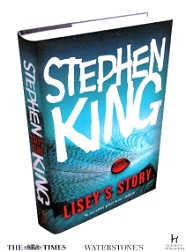
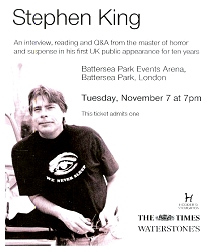
Stephen King is arguably the most famous writer on the planet, and he doesn’t make it over to these shores all that often – the last time being eight years ago for his Bag of Bones signing tour. So when we heard he was going to be in Battersea on 7th November for a signing and live interview, organised in conjunction with Hodder and Stoughton and The Times newspaper, we jumped at the chance to go and see him.
We arrived in London that afternoon and, after the obligatory pit-stop at Forbidden Planet, made our way to Sloane Square tube station, and from there it was just a case of hopping on a 137 bus that would take us to Battersea Park over the bridge. It was a crisp, clear day, although fog had been given out for later on – correction, it wasn’t fog (that would be if we were going to see that other famous horror writer). No, this would be mist…
Walking through Battersea Park on our way to the Events Arena, we stopped on a bench and noted some of other fans that were obviously making their way to the event. One pair of familiar faces were author Stephen Deighan and friend, who had come all the way from Edinburgh. As it said the doors would be opening at 5, we walked up the path towards the impressive building where the interview was taking place. Already there were a number of people in a queue outside the doors, next to huge stands advertising Stephen’s new novel Lisey’s Story. As we waited, we watched the banners going up inside behind the foyer desk, and even saw a taxi arrive painted in the novel’s colours (someone even mentioned that he’d seen a massive projection of the book’s cover on a building earlier that day). Due to unforeseen delays, we weren’t let in until around six o’clock, by which time there must have been about 70 or more waiting, and we were certainly ready for a drink in the reception space.
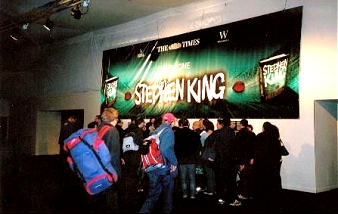
It was here we also bumped into writers Lisa Negus and David Matthews, who’d come straight from work. There was just time for another drink before they opened up the barriers to the audience section and we could find our seats. We had pretty good ones, right next to a camera in fact, so we settled down to wait for the show to begin. Looking back on a crowd that must have numbered about two or three thousand by now, we spotted TV’s Matthew Holness, fresh from his success with the DVD of Garth Marenghi’s Darkplace and spoof chat show Man to Man with Dean Learner airing on Channel 4 on Friday nights.
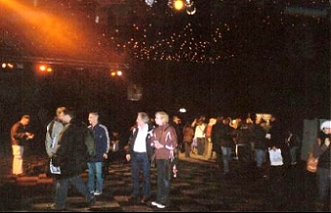
It was then time for the main event to begin, with Peter Florence – who runs the Hay Festival – introducing himself as the interviewer. “I’ve been a fan ever since reading Carrie, countless years ago,” he said. After this, he introduced the person everyone was there to see, Stephen King – who was himself projected on big screens so that people at the back could see. Looking over at the sea of faces, he joked, straight-face but with tongue firmly in cheek, “We’d be in trouble if they attacked…It’s just my job to point these things out.”
Without any further ado, it was into the interview with that inevitable question about where do authors get their ideas cropping up. “I used to say Uttaca – a little shop in Uttaca,” Stephen remarked, but, “but God gets you for saying things like that.” He was, of course, referring to the fact that his daughter is now a minister there, so he’s had to quit saying it. In Lisey’s Story, though, he talks about a pool where we go to drink from, containing language and myth, the mutual language of stories. “It’s where everything from The Iliad to Hansel and Gretel came from.”
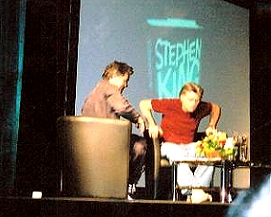
Turning to politics briefly, there was mention of the fact it was election day over in the states. “Have you cast your vote?” Peter asked, and got a quick nod of the head back. “I voted by telepathy,” was Stephen’s reply, which met with laughter from the crowd. He then mused about how all those years ago in The Dead Zone he’d come up with the character of Greg Stillson, only to see a real-life counterpart emerge recently: George Allen in Virginia. On a tangent, Stephen mentioned that he was wearing a pair of boots John Grisham had given him in solidarity for the loss of lives in Iraq.
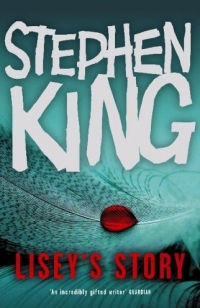
Bringing the conversation back to inspirations, Stephen talked about how Lisey’s Story had come about. In 2001/2002, he suffered from pneumonia, a secondary infection due to a collapsed lung after his accident. “When Tabby visited she asked if she could redo my office, so what could I say?” Upon checking out, she warned him not to go into the office under any circumstances, but, suffering from insomnia one night, that’s exactly what he did. “The carpets were rolled up, the books gone…It was like the ghost of Christmas future.” The thought that one day he might not be around, and that the office might look like this, led to the character of a widowed author’s wife in the novel. Then lightening the mood slightly, he kidded that if one of the aircraft flying over head – we were planted in a flightpath – should crash on the events arena, he’d get the headline. “It’ll read in The Sun, Stephen King dies with 4,000 others in a plane crash.”
He combined that idea with rumours that Catcher in the Rye novelist J.D. Salinger hoarded lots of unfinished manuscripts after he retired, which he was threatening to burn before he died. Peter asked what the inspiration for the stalker in the book was, to which Stephen told him he took the name from the bible – and the story of the demon being driven out into the pigs. “Academics are crazy,” he said, “when it comes to their area of expertise.”
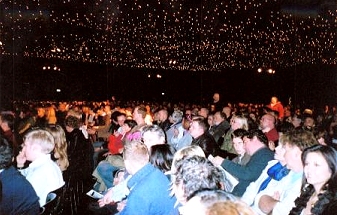
It was obvious he thinks this is the best work he’s done to date. “How did you know when it was done?” he was asked. “When you don’t know what comes next,” came the simple answer. There was concern from his wife, however, that people might think she was Lisey. When he finishes any work, he lets her read and assess it, “and my wife…when she smiles a certain way…It’s like a Mona Lisa smile.” She finished reading Lisey in two days, which is something of a compliment, and when she broached this concern to him, he promised her he’d just tell them the characters weren’t based on him and her. Then he did something he’s very rarely done, “I told her that if she had worries, I’d put it away. She told me it was too good for that.”
Writing about grief and fear was tough, though, he revealed. “But for years I’ve been called a horror writer and you won’t hear me quibble; bookstores need a place to shelve the books. And I can do what I want to do within that broad spectrum.” How he really sees himself is as a, “doctor of emotions. I want to reach and assault you, leave a sonic boom – so you’re either sorry or glad when the story’s over.” It’s all about getting the reaction for him: “If it’s intense like Saw or Texas Chainsaw Massacre, then okay. Or if it’s more subtle and makes you cry, that’s okay too.” All he’s really concerned about is reaching the heart…
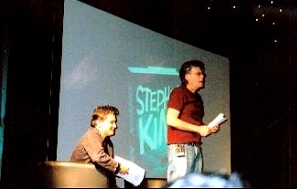
He then talked candidly about being in pain after the accident and making a conscious decision about saying no to the morphine as he felt he was getting hooked, as a lot of people do. “You manufacture the pain to feed the addiction,” he stated. Stephen rounded off by talking about the influence of Richard Matheson on his writing, how Hemingway leaves him cold, and how he tells the difference between a short story idea or a novel: “It just announces itself; it’s a natural thing.” The book also determines what voice, whether it’s first or third or from a male or female perspective.
There was a short break during which Paul had a walk and bumped into Banquet for the Damned author Adam Nevill, who was very much enjoying the evening. Just time for a quick chat and to make arrangements to meet up with the gang later, before we had to settle back in our seats – seats even nearer the front, only one row away from the seats where Peter and Stephen were sitting, thanks to a tip-off from Lisa and David. Two readings from the book followed shortly afterwards, the second involving Stephen’s made up greetings card rhyme from Hallmark – “I wanted a way to do my own without getting sued. You wouldn’t believe how hard it is to dumb down to that level.”
Finally, there was a Q&A with questions from Times readers, the most interesting being about the forthcoming Marvel adaptations of the Dark Tower series, “I really miss those characters” and about whether Stephen read to his own children when they were younger. The ‘professional fans’ nipped off to form a queue for the signings, but we only just about had time for another quick drink with Adam, Lisa and David, before having to catch our bus, tube, then train – with Adam travelling part of the way us. We collapsed into our seats, having had a great evening, and sat back as the train made its journey back to Chesterfield – finally arriving back at about one in the morning.
A memorable night – on a par with when Muriel Gray interviewed Stephen at the Albert Hall ten years ago – and one I don’t think any of us will forget in a very long time. Hopefully it won’t be too long before he’s over again…
Words © Paul Kane & Marie O’Regan 2006
Pictures © Paul Kane & Hodder and Stoughton 2006